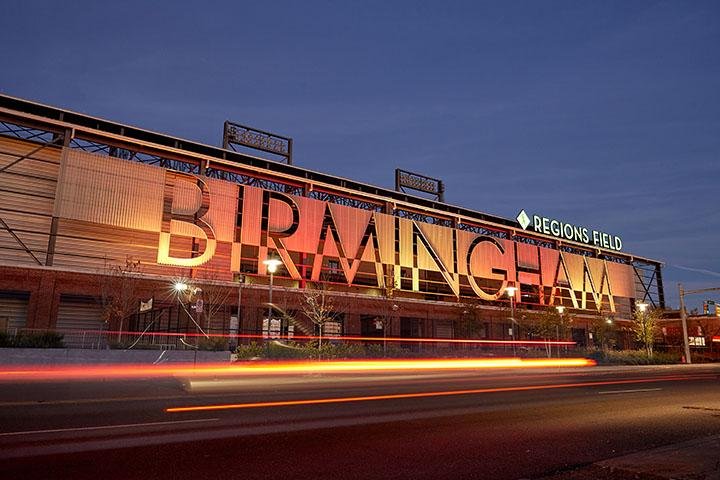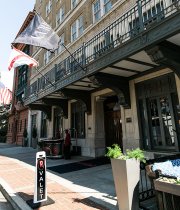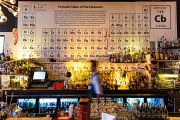On my first trip to Birmingham, I spent the entire visit pursuing Ruben Studdard and Taylor Hicks, the local songbirds who won American Idol in 2002 and 2006, respectively. On my second trip, nearly a dozen years later, I was too busy following the rising star of the Magic City to obsess over fallen reality stars.
Since Jefferson County crawled out of bankruptcy in 2013, Alabama's largest city has revitalized several derelict neighborhoods, earned more recognition from the James Beard Foundation for its chefs and earned a national-monument designation for its Birmingham Civil Rights District -- one of President Barack Obama's last acts in office.
"I have seen more movement and excitement in the last five years than I have in my entire 20 years here," Ford Wiles, chief creative officer of Big Communications, told me outside a downtown bar one recent weekday morning. Of course, I had to ask Wiles whatever happened to Birmingham's Idols. Hicks, I learned, co-owns a barbecue joint and Studdard frequents Cheesecake Factory. Maybe next time, or maybe not.
GO
At Red Mountain Park, if you get red dust on your sneakers, don't wipe it off: That's iron ore, proof that you left your prints on the former mining site. The mountain, which is part of the Appalachians, has stormed back to life as a vertical playground, with 15 miles of hiking and biking trails, a trio of treehouses, a 1,000-foot-long zip line and an aerial adventure course seemingly built by a team of mischievous monkeys.
Birmingham claims the largest number of living Negro leagues players. So it makes sense that the Negro Southern League Museum opened its doors here, mere steps from Regions Field, home of the Birmingham Barons. (One famous alumnus: Michael Jordan. Yes, that MJ.) "Baseball was more than just a game for African-Americans," said director Natasha L. Rogers. "It provided a much-needed social outlet." Practice hitting with legendary pitcher Satchel Paige, whose hologram throws a wicked hurry-up ball.
You can spot the Roman god at Vulcan Park and Museum from 360 degrees of Birmingham, his CrossFit arm raising a spear as if he were planning to carve his name in the sky. At the 10-acre park, climb 159 steps or ride the elevator for a closer glimpse of the 56-foot-tall stud -- a hand, a derriere. In the museum, learn about the world's largest cast-iron statue that still turns heads more than 110 years later.
The 32-acre Sloss Furnaces no longer spews burning slag or paints the sky apocalyptic red.
But on a self-guided tour, I still reflexively ducked as I passed boilers and hot blast stoves that, for 90 years, churned limestone, coke and iron ore into a fiery brew. The National Historic Landmark, which closed in 1971, is now a cultural center with metal-arts workshops, concerts and an annual festival. (This year's headliner: Alabama Shakes.) And though you can no longer buy pig iron, the gift shop does sell iron pigs.
EAT
OvenBird, the second Birmingham restaurant opened by James Beard Award-winner Chris Hastings, is inspired by the cooking techniques of cave men. The kitchen does not use gas or electricity to prepare its small plates, just open fire. The staff pulls a surprising array of foods out of the oven, plancha, smoker box and spit-roaster, including sunchoke paella, braised goat, suckling pig and a beef-fat candle that will further ignite your culinary flame.
The menu at the Collins Bar basically tells guests that there is no menu: "We tailor-make our cocktails," it reads. The bartenders ask a series of questions, such as whether you prefer light or dark liquor and where you fall on the sweet-to-sour scale. Based on my responses, Josh Schaff matched me with a Gin Gin Mule. While you wait for your bespoke beverage, study the Periodic Table of the Elements that pays homage to the science of Birmingham: Stl stands for Steel, Cv is for Civil Rights and Tx represents Taylor Hicks.
Pizitz Food Hall exemplifies global equality; lunch lines are equally long for gourmet Italian cheese sandwiches, Hawaiian poke, Israeli falafel, Mexican paletas and Southern waffles. If you spill your lunch on your shirt, pick up a "It's Nice to Have You in Birmingham" T-shirt from Yellowhammer Creative. Opt for the dark blue if you plan to go back for seconds.
Highlands Bar and Grill, a dining destination since 1982, transports France to the American South, marrying "je ne sais quoi" with a bit of y'all. The Frank Stitt establishment captures the spirit of a brasserie with chic vintage posters and a marble bar that serves oysters harvested from Alabama to New Brunswick. The menu changes daily, but the stone-ground baked grits always make a grand appearance.
The tomato salad at Hot and Hot Fish Club is so popular, the restaurant hires one guy solely to prepare the seasonal dish. The 21-year-old eatery, which occupies a former pool hall, follows the gospel of micro-seasonality. One day, you'll see shad roe or crawfish or ramps on the menu; the next day, the flash-on-the-plate ingredient is gone until the next harvest.
SHOP
Daniel Drinkard cast an eye over the rows of bins at Seasick Records and made a quick calculation: about 8,000 records, equally divided between new and used. For the obsessed collector, the shop sells indie-exclusive colored albums; Ryan Adams' red version of Prisoner recently flew out the door. Musicians occasionally perform on a shoe-box stage in the back, and a pair of barbers cut hair by the front window, the buzz of the shaver adding an unexpected wall of sound.
At Club Duquette, Duquette and Morgan Johnston, a musician-and-artist couple, have elevated the mom-and-pop (and toddler) shop to a stylish boutique. Copycat their aesthetic with a graphic T-shirt emblazoned with such insider-Birmingham phrases as "Surf East Lake," a customized vintage military jacket with handmade patches or an oil essence that is blended on the premises and could become your Proustian fragrance.
At Pepper Place, a Dr Pepper sign reminds visitors of the site's original widgets. Today, the former industrial complex houses restaurants, coffee shops and several home design and decor retailers. Atmosphere owner Barri Thompson can turn a suburban den into a sultan's lair with an Icelandic lambskin throw, a rope day bed from Indonesia and a gold LOVE painting by local artist Matt Underwood; Charlie Thigpen's Garden Gallery seeds a Beatrix Potter patch with Alabama crafts such as recycled-bottle wind chimes and pottery pressed with leaves.
How deep would Chatham Hellmers dive for bling? "I would jump into a dumpster if I knew there was a rhinestone choker on the bottom," she said. The New York native's store, Charm, is brimming with vintage, homemade and statement pieces, such as a necklace that you could never don in polite company. The designer describes repurposed antique jewelry as "Victorian trash"; another collection resembles wearable steampunk art. Charm is also a temple of rebirth. I left with hoop earrings that once rolled as bicycle inner tubes.
STAY
Spend the night in the elegant Empire Hotel, which is scheduled to open in a former bank in mid-April, and you can boast to your friends that you slept on the "heaviest corner on Earth." The nickname, which was coined in the early 1900s, refers to four buildings on 20th Street and First Avenue North that were once deemed the tallest structures in the South. (The Empire tied with a neighbor at 16 stories.) However, the five-star restaurant on the ground floor and the casual dining spot on the roof might cause guests to reinterpret the meaning of "heavy."
Hank Williams spent the penultimate evening of his life at the Redmont Hotel, but his ghost might not recognize the property since it reopened last year. The city's oldest hotel has mod furnishings with a touch of sparkle, a rooftop bar with a record player and a lobby-level restaurant called Harvest. To conjure his spirit, I stood under the original early-20th-century chandelier and whispered my room number, just in case he was in town and needed a place to crash.
EXPLORE
A mural on the wall reads, "It's Awesome to Have You in Avondale," but years ago, the message might have been more cautionary. The neighborhood's transformation started with the 2011 renovation of Avondale Park and has trickled up 41st Street. There's Saturn, a planetary-theme bar with board games, Sega and concerts; Post Office Pies, a wood-fired pizza joint in an old mail facility; and Fancy's on Fifth, an oyster-and-burger spot with Magic 8-Ball centerpieces. At Hot Diggity Dogs, step through a police phone booth and enter the Marble Ring, a speakeasy-style bar with Roaring Twenties swing.
Water hoses and attack dogs at Kelly Ingram Park. The tragic bombing at the 16th Street Baptist Church. The momentous arrival of the Rev. Martin Luther King Jr. The nonviolent movement that helped desegregate the city. It all happened here, in the Birmingham Civil Rights District. The newly minted national monument comprises several pillars of the struggle for equality, including the Birmingham Civil Rights Institute and the A.G. Gaston Motel, which King used as his "war room." Signs mark the protesters' route to City Hall, where "We Shall Overcome" still resonates more than a half-century later.
For more information, visit birminghamal.org.
Travel on 03/26/2017




